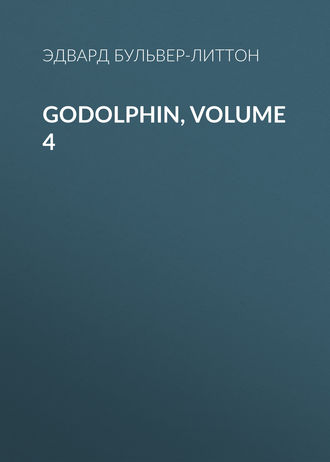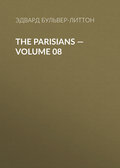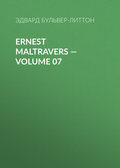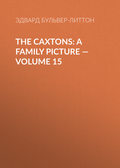
Эдвард Бульвер-Литтон
Godolphin, Volume 4
CHAPTER XXXII
THE WEAKNESS OF ALL VIRTUE SPRINGING ONLY FROM THE FEELINGS
It was the evening before Godolphin left Rome. As he was entering his palazzo he descried, in the darkness, and at a little distance, a figure wrapped in a mantle, that reminded him of Lucilla;—ere he could certify himself, it was gone.
On entering his rooms, he looked eagerly over the papers and notes on his table: he seemed disappointed with the result, and sat himself down in moody and discontented thought. He had written to Lucilla the day before, a long, a kind, nay, a noble outpouring of his thoughts and feelings. As far as he was able to one so simple in her experience, yet so wild in her fancy, he explained to her the nature of his struggles and his self-sacrifice. He did not disguise from her that, till the moment of her confession, he had never examined the state of his heart towards her; nor that, with that confession, a new and ardent train of sentiment had been kindled within him. He knew enough of women to be aware, that the last avowal would be the sweetest consolation both to her vanity and her heart. He assured her of the promises he had received from her relations to grant her the liberty and the indulgence that her early and unrestrained habits required; and, in the most delicate and respectful terms, he inclosed an order for a sum of money sufficient at any time to command the regard of those with whom she lived, or to enable her to choose, should she so desire (though he advised her not to adopt such a measure, save for the most urgent reasons), another residence. "Send me in return," he said, as he concluded, "a lock of your hair. I want nothing to remind me of your beauty; but I want some token of the heart of whose affection I am so mournfully proud. I will wear it as a charm against the contamination of that world of which you are so happily ignorant—as a memento of one nature beyond the thought of self—as a surety that, in finding within this base and selfish quarter of earth, one soul so warm, so pure as yours, I did not deceive myself, and dream. If we ever meet again, may you have then found some one happier than I am, and in his tenderness have forgotten all of me save one kind remembrance.—Beautiful and dear Lucilla, adieu! If I have not given way to the luxury of being beloved by you, it is because your generous self-abandonment has awakened within a heart too selfish to others a real love for yourself."
To this letter Godolphin had, hour after hour, expected a reply. He received none—not even the lock of hair for which he had pressed. He was disappointed—angry, with Lucilla—dissatisfied with himself. "How bitterly," thought he, "the wise Saville would smile at my folly! I have renounced the bliss of possessing this singular and beautiful being; for what?—a scruple which she cannot even comprehend, and at which, in her friendless and forlorn state, the most starched of her dissolute countrywomen would smile as a ridiculous punctilio. And, in truth, had I fled hence with her, should I not have made her through out life happier—far happier, than she will be now? Nor would she, in that happiness, have felt, like an English girl, any pang of shame. Here, the tie would have never been regarded as a degradation; nor does she, recurring to the simple laws of nature, imagine than any one could so regard it. Besides, inexperienced as she is—the creature of impulse—will she not fall a victim to some more artful and less generous lover?—to some one who in her innocence will see only forwardness; and who, far from protecting her as I should have done, will regard her but as the plaything of an hour, and cast her forth the moment his passion is sated!—Sated! O bitter thought, that the head of another should rest upon that bosom now so wholly mine! After all, I have, in vainly adopting a seeming and sounding virtue, merely renounced my own happiness to leave her to the chances of being permanently rendered unhappy, and abandoned to want, shame, destitution, by another!"
These disagreeable and regretful thoughts were, in turn, but weakly combated by the occasional self-congratulation that belongs to a just or generous act, and were varied by a thousand conjectures—now of anxiety, now of anger—as to the silence of Lucilla. Sometimes he thought–but the thought only glanced partially across him, and was not distinctly acknowledged—that she might seek an interview with him ere he departed; and in this hope he did not retire to rest till the dawn broke over the ruins of the mighty and breathless city. He then flung himself on a sofa without undressing, but could not sleep, save in short and broken intervals.
The next day, he put off his departure till noon, still in the hope of hearing from Lucilla, but in vain. He could not flatter himself with the hope that Lucilla did not know the exact time for his journey—he had expressly stated it. Sometimes he conceived the notion of seeking her again; but he knew too well the weakness of his generous resolution; and, though infirm of thought, was yet virtuous enough in act not to hazard it to certain defeat. At length in a momentary desperation, and muttering reproaches on Lucilla for her fickleness and inability to appreciate the magnanimity of his conduct, he threw himself into his carriage, and bade adieu to Rome.
As every grove that the traveller passes on that road was guarded once by a nymph, so now it is hallowed by a memory. In vain the air, heavy with death, creeps over the wood, the rivulet, and the shattered tower;—the mind will not recur to the risk of its ignoble tenement; it flies back; it is with the Past! A subtle and speechless rapture fills and exalts the spirit. There—far to the West—spreads that purple sea, haunted by a million reminiscences of glory; there the mountains, with their sharp and snowy crests, rise into the bosom of the heavens; on that plain, the pilgrim yet hails the traditional tomb of the Curiatii and those immortal Twins who left to their brother the glory of conquest, and the shame by which it was succeeded: around the Lake of Nemi yet bloom the sacred groves by which Diana raised Hippolytus again into life. Poetry, Fable, History, watch over the land: it is a sepulchre; Death is within and around it; Decay writes defeature upon every stone; but the Past sits by the tomb as a mourning angel; a soul breathes through the desolation; a voice calls amidst the silence. Every age that bath passed away bath left a ghost behind it; and the beautiful land seems like that imagined clime beneath the earth in which man, glorious though it be, may not breathe and live—but which is populous with holy phantoms and illustrious shades.
On, on sped Godolphin. Night broke over him as he traversed the Pontine Marshes. There, the malaria broods over its rankest venom: solitude hath lost the soul that belonged to it: all life, save the deadly fertility of corruption, seems to have rotted away: the spirit falls stricken into gloom; a nightmare weighs upon the breast of Nature; and over the wrecks of Time, Silence sits motionless in the arms of Death.
He arrived at Terracina, and retired to rest. His sleep was filled with fearful dreams; he woke, late at noon, languid and dejected. As his servant, who had lived with him some years, attended him in rising, Godolphin observed on his countenance that expression common to persons of his class when they have something which they wish to communicate, and are watching their opportunity.
"Well, Malden!" said he, "you look important this morning: what has happened?"
"E—hem! Did not you observe, sir, a carriage behind us as we crossed the marshes? Sometimes you might just see it at a distance, in the moonlight."
"How the deuce should I, being within the carriage, see behind me? No; I know nothing of the carriage: what of it?"
"A person arrived in it, sir, a little after you—would not retire to bed—and waits you in your sitting-room."
"A person! what person!"
"A lady, sir,—a young lady;" said the servant, suppressing a smile.
"Good heavens!" ejaculated Godolphin: "leave me." The valet obeyed.
Godolphin, not for a moment doubting that it was Lucilla who had thus followed him, was struck to the heart by this proof of her resolute and reckless attachment. In any other woman, so bold a measure would, it is true, have revolted his fastidious and somewhat English taste. But in Lucilla, all that might have seemed immodest arose, in reality, from that pure and spotless ignorance which, of all species of modesty, is the most enchanting, the most dangerous to its possessor. The daughter of loneliness and seclusion—estranged wholly from all familiar or female intercourse—rather bewildered than in any way enlightened by the few books of poetry, or the lighter letters, she had by accident read—the sense of impropriety was in her so vague a sentiment, that every impulse of her wild and impassioned character effaced and swept it away. Ignorant of what is due to the reserve of the sex, and even of the opinions of the world—lax as the Italian world is on matters of love—she only saw occasion to glory in her tenderness, her devotion, to one so elevated in her fancy as the English stranger. Nor did there—however unconsciously to herself—mingle a single more derogatory or less pure emotion with her fanatical worship.
For my own part, I think that few men understand the real nature of a girl's love. Arising so vividly as it does from the imagination, nothing that the mind of the libertine would impute to it ever (or at least in most rare in stances) sullies its weakness or debases its folly. I do not say the love is better for being thus solely the creature of imagination: I say only, so it is in ninety-nine out of a hundred instances of girlish infatuation. In later life, it is different: in the experienced woman, forwardness is always depravity.
With trembling steps and palpitating heart, Godolphin sought the apartment in which he expected to find Lucilla. There, in one corner of the room, her face covered with her mantle, he beheld her: he hastened to that spot; he threw himself on his knees before her; with a timid hand he removed the covering from her face; and through tears, and paleness, and agitation, his heart was touched to the quick by its soft and loving expression.
"Wilt thou forgive me?" she faltered; "it was thine own letter that brought me hither. Now leave me, if thou canst!"
"Never, never!" cried Godolphin, clasping her to his heart. "It is fated, and I resist no more. Love, tend, cherish thee, I will to my last hour. I will be all to thee that human ties can afford—father, brother, lover—all but–" He paused; "all but husband," whispered his conscience, but he silenced its voice.
"I may go with thee!" said Lucilla, in wild ecstasy: that was her only thought.
As, when the notion of escape occurs to the insane, their insanity appears to cease; courage, prudence, caution, invention (faculties which they knew not in sounder health), flash upon and support them as by an inspiration; so, a new genius had seemed breathed into Lucilla by the idea of rejoining Godolphin. She imagined—not without justice—that, could she throw in the way of her return home an obstacle of that worldly nature which he seemed to dread she should encounter, his chief reason for resisting her attachment would be removed. Encouraged by this thought, and more than ever transported by her love since he had expressed a congenial sentiment: excited into emulation by the generous tone of his letter, and softened into yet deeper weakness by its tenderness;—she had resolved upon the bold step she adopted. A vetturino lived near the gate of St. Sebastian: she had sought him; and at sight of the money which Godolphin had sent her, the vetturino willingly agreed to transport her to whatever point on the road to Naples she might desire—nay, even to keep pace with the more rapid method of travelling which Godolphin pursued. Early on the morning of his departure, she had sought her station within sight of Godolphin's palazzo; and ten minutes after his departure the vetturino bore her, delighted but trembling, on the same road.
The Italians are ordinarily good-natured, especially when they are paid for it; and courteous to females, especially if they have any suspicion of the influence of the belle passion. The vetturino's foresight had supplied the deficiencies of her inexperience: he had reminded her of the necessity of procuring her passport; and he undertook that all other difficulties should solely devolve on him. And thus Lucilla was now under the same roof with one for whom, indeed, she was unaware of the sacrifice she made, but whom, despite of all that clouded and separated their after-lot, she loved to the last, with a love as reckless and strong as then—a love passing the love of woman, and defying the common ordinances of time.
* * * * * * * * * * * * * * * * * *
On the blue waters that break with a deep and far voice along the rocks of that delicious shore, above which the mountain that rises behind Terracina scatters to the air the odours of the citron and the orange—on that sounding and immemorial sea the stars, like the hopes of a brighter world upon the darkness and unrest of life, shone down with a solemn but tender light. On that shore stood Lucilla and he—the wandering stranger—in whom she had hoarded the peace and the hopes of earth. Hers was the first and purple flush of the love which has attained its object; that sweet and quiet fulness of content—that heavenly, all-subduing and subdued delight, with which the heart slumbers in the excess of its own rapture. Care—the forethought of change—even the shadowy and vague mournfulness of passion—are felt not in those voluptuous but tranquil moments. Like the waters that rolled, deep and eloquent, before her, every feeling within was but the mirror of an all-gentle and cloudless heaven. Her head half-declined upon the breast of her young lover, she caught the beating of his heart, and in it heard all the sounds of what was now become to her the world.
And still and solitary deepened around them the mystic and lovely night. How divine was that sense and consciousness of solitude! how, as it thrilled within them, they clung closer to each other! Theirs as yet was that blissful and unsated time when the touch of their hands, clasped together, was in itself a happiness of emotion too deep for words. And ever, as his eyes sought hers, the tears which the sensitiveness of her frame, in the very luxury of her overflowing heart, called forth, glittered in the tranquil stars a moment and were kissed away. "Do not look up to heaven, my love," whispered Godolphin, "lest thou shouldst think of any world but this!"
Poor Lucilla! will any one who idly glances over this page sympathise one moment with the springs of thy brief joys and thy bitter sorrow? The page on which, in stamping a record of thee, I would fain retain thy memory from oblivion; that page is an emblem of thyself;—a short existence; confounded with the herd to which it has no resemblance, and then, amidst the rush and tumult of the world, forgotten and cast away for ever!







